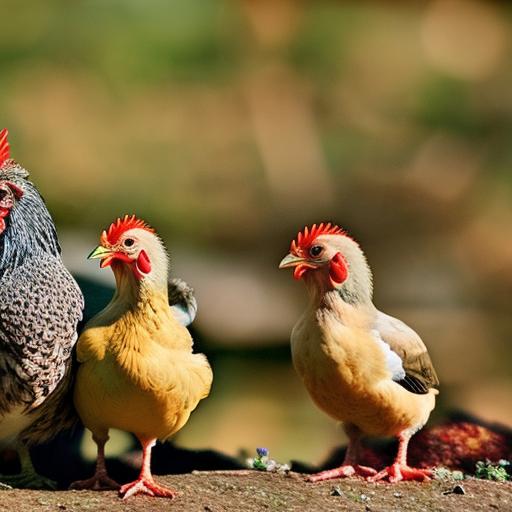It was a sunny morning on the farm when I made a shocking discovery in my chicken coop. As I walked in to feed my flock, I was met with a sight that sent chills down my spine – several of my chickens lay lifeless on the ground. It was a devastating sight, and I immediately knew that I had to address the issue promptly to prevent further deaths. This experience taught me the importance of being vigilant and proactive when it comes to the health and well-being of my chickens.
Addressing the issue promptly is crucial for several reasons. Firstly, it allows you to identify the cause of the deaths and take appropriate action to prevent further losses. Secondly, it helps to protect the overall health of your flock. If left unchecked, diseases or other issues can quickly spread among your chickens, leading to more deaths and potentially devastating consequences for your entire flock. By taking immediate action, you can minimize the impact and protect the well-being of your remaining chickens.
Key Takeaways
- Dead chickens can be a shocking discovery for any poultry owner.
- Identifying symptoms of sick chickens and conducting post-mortem examinations can help determine the cause of death.
- Common causes of chicken deaths include disease, parasites, and environmental factors.
- Biosecurity measures and effective treatment plans can prevent the spread of disease and promote chicken health.
- Proper nutrition and emotional support are also important for maintaining a healthy flock.
Identifying the Symptoms of Sick Chickens
Recognizing the symptoms of sick chickens is essential for early intervention and treatment. Some common symptoms to look out for include lethargy, loss of appetite, weight loss, abnormal droppings, respiratory distress, feather loss, and changes in behavior. It’s important to note that these symptoms can vary depending on the underlying cause of illness, so it’s crucial to observe your chickens closely and seek veterinary advice if needed.
Early recognition of these symptoms is vital because it allows you to take prompt action and prevent further deterioration of your chickens’ health. By identifying sick chickens early on, you can isolate them from the rest of the flock to prevent the spread of disease. Additionally, early intervention increases the chances of successful treatment and recovery for your sick chickens.
Common Causes of Chicken Deaths
There are several common causes of chicken deaths that every poultry owner should be aware of. Disease is one of the leading causes of chicken deaths. Common diseases include avian influenza, Newcastle disease, infectious bronchitis, and coccidiosis. These diseases can spread rapidly among your flock if not properly managed.
Predators are another common cause of chicken deaths. Foxes, raccoons, snakes, and even domestic pets can pose a threat to your chickens. It’s important to secure your coop and run with sturdy fencing and locks to prevent predators from gaining access.
Environmental factors can also contribute to chicken deaths. Extreme temperatures, poor ventilation, and unsanitary living conditions can all have a negative impact on your chickens’ health. It’s crucial to provide a clean and comfortable environment for your flock to thrive.
To prevent these causes of chicken deaths, there are several steps you can take. Implementing biosecurity measures, such as regular cleaning and disinfection of the coop, practicing good hygiene, and limiting contact with other poultry or wild birds can help prevent the spread of disease. Installing secure fencing and using deterrents like motion-activated lights or noise devices can help deter predators. Finally, ensuring proper ventilation and maintaining clean living conditions will help create a healthy environment for your chickens.
Conducting a Post-Mortem Examination
| Metrics | Description |
|---|---|
| Number of post-mortem examinations conducted | The total number of post-mortem examinations performed in a given time period. |
| Time to complete a post-mortem examination | The average time it takes to complete a post-mortem examination, from the time the body arrives to the time the examination is complete. |
| Accuracy of cause of death determination | The percentage of cases where the cause of death was accurately determined through the post-mortem examination. |
| Number of cases referred for further investigation | The number of cases where the post-mortem examination revealed suspicious or unclear circumstances surrounding the death, leading to further investigation. |
| Number of cases where autopsy was declined | The number of cases where the family or legal representative declined to have an autopsy performed. |
Conducting a post-mortem examination is an important step in understanding the cause of chicken deaths. It involves examining the body of the deceased chicken to identify any abnormalities or signs of disease. This process can provide valuable information that can help prevent future deaths in your flock.
To conduct a post-mortem examination, you will need gloves, a sharp knife or scalpel, and a clean surface to work on. Start by carefully examining the external body for any signs of injury or trauma. Look for any abnormalities in the feathers, skin, or eyes. Next, make an incision along the midline of the abdomen to examine the internal organs. Look for any signs of infection, inflammation, or abnormalities in the organs.
It’s important to note that conducting a post-mortem examination should be done with caution and preferably under the guidance of a veterinarian or experienced poultry keeper. If you are unsure or uncomfortable with the process, it’s best to seek professional help.
Preventing the Spread of Disease in Your Flock
Preventing the spread of disease in your flock is crucial for maintaining the health and well-being of your chickens. Biosecurity measures play a vital role in preventing the introduction and spread of diseases. Biosecurity refers to a set of practices and protocols aimed at reducing the risk of disease transmission.
One of the most important biosecurity measures is limiting contact with other poultry or wild birds. This can be achieved by keeping your chickens confined to their coop and run and avoiding contact with other flocks. It’s also important to practice good hygiene by regularly cleaning and disinfecting the coop, equipment, and footwear. Additionally, monitoring your flock for any signs of illness and seeking veterinary advice when needed is essential for early intervention and prevention.
Understanding the Importance of Biosecurity Measures

Biosecurity measures are crucial for protecting your flock from diseases and preventing future deaths. They help minimize the risk of disease transmission and maintain a healthy environment for your chickens. By implementing effective biosecurity measures, you can reduce the likelihood of introducing diseases to your flock and prevent the spread of existing diseases.
Some examples of effective biosecurity measures include:
1. Limiting access to your property: Restricting access to your property helps prevent unauthorized individuals from introducing diseases to your flock.
2. Quarantine: Quarantining new birds before introducing them to your flock allows you to monitor them for any signs of illness and prevent the spread of disease.
3. Cleaning and disinfection: Regularly cleaning and disinfecting the coop, equipment, and footwear helps eliminate pathogens and reduce the risk of disease transmission.
4. Rodent and pest control: Implementing measures to control rodents and pests helps prevent the spread of diseases carried by these animals.
5. Vaccination: Vaccinating your chickens against common diseases can help protect them from illness and reduce the risk of death.
Implementing Effective Treatment Plans for Sick Chickens
Seeking veterinary care for sick chickens is crucial for implementing effective treatment plans. A veterinarian will be able to diagnose the underlying cause of illness and provide appropriate treatment options. It’s important to remember that self-diagnosis and self-medication can be dangerous and may lead to further complications or even death.
When seeking veterinary care, it’s helpful to provide as much information as possible about your chickens’ symptoms, behavior, and living conditions. This will assist the veterinarian in making an accurate diagnosis and developing an effective treatment plan. Follow the veterinarian’s instructions carefully and administer any prescribed medications or treatments as directed.
In addition to veterinary care, there are some general tips for implementing effective treatment plans for sick chickens. Isolate sick chickens from the rest of the flock to prevent the spread of disease. Provide a clean and comfortable environment for your sick chickens to aid in their recovery. Ensure they have access to fresh water and nutritious food to support their immune system.
The Role of Nutrition in Chicken Health
Proper nutrition plays a vital role in maintaining the health and well-being of your chickens. A balanced diet provides essential nutrients that support their immune system, promote growth, and prevent diseases. It’s important to ensure that your chickens are getting the nutrients they need to thrive.
A good quality chicken feed is the foundation of a healthy diet for your flock. Look for feeds that are specifically formulated for the age and type of chickens you have. These feeds are designed to provide the necessary nutrients in the correct proportions. Additionally, supplementing their diet with fresh fruits, vegetables, and protein sources like mealworms or kitchen scraps can provide additional nutrients and variety.
It’s important to monitor your chickens’ body condition and adjust their feed accordingly. Overfeeding can lead to obesity and health problems, while underfeeding can result in malnutrition and weakened immune systems. Regularly assess their body condition and consult with a poultry nutritionist or veterinarian if you have any concerns.
Coping with the Emotional Toll of Losing Chickens
Losing chickens can be emotionally challenging for poultry owners. These birds often become part of the family, and their loss can be deeply felt. It’s important to acknowledge the emotional toll of losing chickens and take steps to cope with the grief.
One way to cope with the loss is to allow yourself to grieve. It’s normal to feel sadness, anger, or guilt when losing a beloved chicken. Give yourself permission to experience these emotions and find healthy ways to express them, such as talking to a supportive friend or family member.
Another helpful coping strategy is to focus on the positive memories you shared with your chickens. Remember the joy they brought to your life and the happiness they experienced under your care. Consider creating a memorial or tribute to honor their memory.
Finally, consider reaching out to other poultry owners or joining online communities where you can find support and understanding from people who have experienced similar losses. Sharing your feelings and experiences with others who can relate can provide comfort and solace during this difficult time.
Moving Forward: Rebuilding Your Flock and Preventing Future Deaths
After experiencing the loss of chickens, it’s important to take steps to prevent future deaths and rebuild your flock. Start by identifying the cause of the deaths and addressing any underlying issues. If disease was the cause, implement biosecurity measures to prevent further spread. If predators were responsible, reinforce your coop and run to make it more secure.
When rebuilding your flock, consider sourcing new chickens from reputable breeders or hatcheries that prioritize the health and well-being of their birds. Quarantine new birds before introducing them to your existing flock to prevent the spread of disease. Monitor your chickens closely for any signs of illness and seek veterinary care if needed.
Moving forward, it’s important to remain vigilant and proactive in caring for your flock. Regularly assess their health, provide a balanced diet, and maintain a clean and comfortable living environment. By taking these steps, you can help prevent future deaths and ensure the long-term health and well-being of your chickens.
If you’re experiencing the unfortunate situation of chickens dying on your farm, it’s crucial to investigate the possible causes and find solutions to prevent further losses. One potential factor that could be affecting your chickens’ health is the design and location of their coop. A well-designed chicken coop plays a vital role in providing a safe and comfortable environment for your flock. To learn more about the importance of a suitable chicken coop and where to place it, check out this informative article on Poultry Wizard: Where to Put Your Chicken Coop. By implementing the right coop setup, you can help ensure the well-being and longevity of your chickens.
FAQs
What could be causing my chickens to die?
There are several factors that could be causing your chickens to die, including disease, parasites, poor nutrition, extreme weather conditions, and predator attacks.
How can I prevent my chickens from dying?
To prevent your chickens from dying, you should provide them with a clean and safe living environment, feed them a balanced diet, protect them from predators, and regularly check for signs of illness or parasites.
What are some common diseases that can affect chickens?
Some common diseases that can affect chickens include avian influenza, Newcastle disease, infectious bronchitis, Marek’s disease, and coccidiosis.
What are some signs that my chickens may be sick?
Some signs that your chickens may be sick include lethargy, loss of appetite, weight loss, diarrhea, respiratory distress, and abnormal behavior.
What should I do if I suspect my chickens are sick?
If you suspect your chickens are sick, you should isolate them from the rest of the flock, consult with a veterinarian, and follow their recommended treatment plan. It is also important to practice good biosecurity measures to prevent the spread of disease.
Meet Walter, the feathered-friend fanatic of Florida! Nestled in the sunshine state, Walter struts through life with his feathered companions, clucking his way to happiness. With a coop that’s fancier than a five-star hotel, he’s the Don Juan of the chicken world. When he’s not teaching his hens to do the cha-cha, you’ll find him in a heated debate with his prized rooster, Sir Clucks-a-Lot. Walter’s poultry passion is no yolk; he’s the sunny-side-up guy you never knew you needed in your flock of friends!







